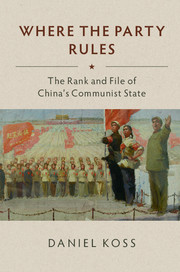Book contents
- Frontmatter
- Contents
- List of Figures
- List of Tables
- Acknowledgments
- PART I AUTOCRATIC GRASSROOTS POLITICS
- 1 Introduction: Party-Based Authoritarianism in China
- 2 A Theory of Authoritarian Regime Parties
- PART II THE PARTY IN CONTEMPORARY CHINA
- PART III THE PARTY'S ORIGINS
- PART IV THE PARTY IN THE MAO ERA
- Appendix 1 Party-versus-Bureaucracy Model
- Appendix 2 Party Growth Model
- Notes
- Primary Material
- Secondary Sources
- Index
2 - A Theory of Authoritarian Regime Parties
from PART I - AUTOCRATIC GRASSROOTS POLITICS
Published online by Cambridge University Press: 21 April 2018
- Frontmatter
- Contents
- List of Figures
- List of Tables
- Acknowledgments
- PART I AUTOCRATIC GRASSROOTS POLITICS
- 1 Introduction: Party-Based Authoritarianism in China
- 2 A Theory of Authoritarian Regime Parties
- PART II THE PARTY IN CONTEMPORARY CHINA
- PART III THE PARTY'S ORIGINS
- PART IV THE PARTY IN THE MAO ERA
- Appendix 1 Party-versus-Bureaucracy Model
- Appendix 2 Party Growth Model
- Notes
- Primary Material
- Secondary Sources
- Index
Summary
Political parties are most efficacious instruments for autocrats to govern modernizing societies. As socioeconomic development puts increasing strains on nondemocratic systems and as episodes of economic downturn can quickly throw regimes into disarray, authoritarian leaders have a better chance to maintain order if they rely on a party apparatus, rather than on personalistic arrangements or military cliques. Maintaining order is not merely a question of sheer regime survival, but also of effective governance on an everyday basis, which reflects the strength of a regime.
Recognizing that parties make such a big difference for authoritarian strength, the literature on authoritarian parties is now among the most vibrant fields of political science inquiry. This literature has pinpointed two important questions: How exactly do authoritarian parties contribute to political order? And what makes authoritarian parties strong to begin with? To both questions answers are emerging, but they do not sit well with the case of the Chinese Communist Party. Therefore, by introducing into the debate the case of China, this book contributes to improving the answers to both questions.
But before delving deep into the case of the CCP, this chapter develops elements for a new theory of authoritarian regime parties, which could plausibly apply to many other undemocratic governments as well, including historical ones. The theory first addresses the question of how exactly parties help effective governance, focusing on the maintenance of political order in ordinary times and in times of crisis. It has implications for, but does not directly speak to, questions of regime durability. Existing answers revolve around three central ideas, which the following section spells out in detail. Each idea captures important aspects of contemporary regime parties, but the focus is too narrow and misses other important aspects of what authoritarian parties are, what they do, and how they make regimes strong.
• According to conventional views, authoritarian parties moderate elite conflict at the central commanding heights of power. In fact, regime parties operate not only at the centers of power, but also at the periphery. Often the distinct strength of parties is precisely their deep penetration of society and their nationwide projection of authority based on their local presence.
- Type
- Chapter
- Information
- Where the Party RulesThe Rank and File of China's Communist State, pp. 35 - 82Publisher: Cambridge University PressPrint publication year: 2018



